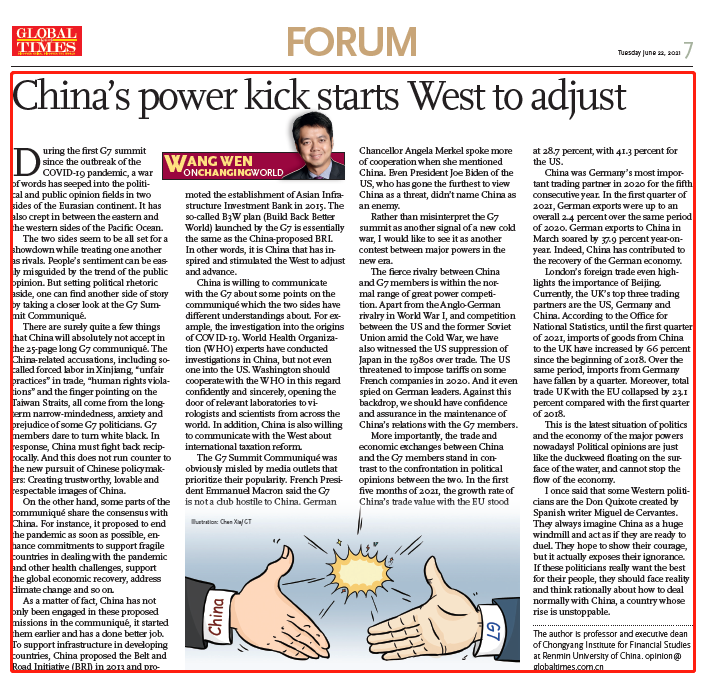Commentaries
Your Present Location: Teacher_Home> Wang Wen> CommentariesWang Wen: China’s power kick starts West to adjust
By: Wang Wen Source: Global Times Published: 2021-06-22
During the first G7 summit since the outbreak of the COVID-19 pandemic, a war of words has seeped into the political and public opinion fields in two sides of the Eurasian continent. It has also crept in between the eastern and the western sides of the Pacific Ocean.

The two sides seem to be all set for a showdown while treating one another as rivals. People's sentiment can be easily misguided by the trend of the public opinion. But setting political rhetoric aside, one can find another side of story by taking a closer look at the G7 Summit Communiqué.
There are surely quite a few things that China will absolutely not accept in the 25-page long G7 communiqué. The China-related accusations, including so-called forced labor in Xinjiang, "unfair practices" in trade, "human rights violations" and the finger pointing on the Taiwan Straits, all come from the long-term narrow-mindedness, anxiety and prejudice of some G7 politicians. G7 members dare to turn white black. In response, China must fight back reciprocally. And this does not run counter to the new pursuit of Chinese policymakers: Creating trustworthy, lovable and respectable images of China.
On the other hand, some parts of the communiqué share the consensus with China. For instance, it proposed to end the pandemic as soon as possible, enhance commitments to support fragile countries in dealing with the pandemic and other health challenges, support the global economic recovery, address climate change and so on.
As a matter of fact, China has not only been engaged in these proposed missions in the communiqué, it started them earlier and has a done better job. To support infrastructure in developing countries, China proposed the Belt and Road Initiative (BRI) in 2013 and promoted the establishment of Asian Infrastructure Investment Bank in 2015. The so-called B3W plan (Build Back Better World) launched by the G7 is essentially the same as the China-proposed BRI. In other words, it is China that has inspired and stimulated the West to adjust and advance.
China is willing to communicate with the G7 about some points on the communiqué which the two sides have different understandings about. For example, the investigation into the origins of COVID-19. World Health Organization (WHO) experts have conducted investigations in China, but not even one into the US. Washington should cooperate with the WHO in this regard confidently and sincerely, opening the door of relevant laboratories to virologists and scientists from across the world. In addition, China is also willing to communicate with the West about international taxation reform.
The G7 Summit Communiqué was obviously misled by media outlets that prioritize their popularity. French President Emmanuel Macron said the G7 is not a club hostile to China. German Chancellor Angela Merkel spoke more of cooperation when she mentioned China. Even President Joe Biden of the US, who has gone the furthest to view China as a threat, didn't name China as an enemy.
Rather than misinterpret the G7 summit as another signal of a new cold war, I would like to see it as another contest between major powers in the new era.
The fierce rivalry between China and G7 members is within the normal range of great power competition. Apart from the Anglo-German rivalry in World War I, and competition between the US and the former Soviet Union amid the Cold War, we have also witnessed the US suppression of Japan in the 1980s over trade. The US threatened to impose tariffs on some French companies in 2020. And it even spied on German leaders. Against this backdrop, we should have confidence and assurance in the maintenance of China's relations with the G7 members.
More importantly, the trade and economic exchanges between China and the G7 members stand in contrast to the confrontation in political opinions between the two. In the first five months of 2021, the growth rate of China's trade value with the EU stood at 28.7 percent, with 41.3 percent for the US.
China was Germany's most important trading partner in 2020 for the fifth consecutive year. In the first quarter of 2021, German exports were up to an overall 2.4 percent over the same period of 2020. German exports to China in March soared by 37.9 percent year-on-year. Indeed, China has contributed to the recovery of the German economy.
London's foreign trade even highlights the importance of Beijing. Currently, the UK's top three trading partners are the US, Germany and China. According to the Office for National Statistics, until the first quarter of 2021, imports of goods from China to the UK have increased by 66 percent since the beginning of 2018. Over the same period, imports from Germany have fallen by a quarter. Moreover, total trade UK with the EU collapsed by 23.1 percent compared with the first quarter of 2018.
This is the latest situation of politics and the economy of the major powers nowadays! Political opinions are just like the duckweed floating on the surface of the water, and cannot stop the flow of the economy.
In my previous column, I once said that some Western politicians are the Don Quixote created by Spanish writer Miguel de Cervantes. They always imagine China as a huge windmill and act as if they are ready to duel. They hope to show their courage, but it actually exposes their ignorance. If these politicians really want the best for their people, they should face reality and think rationally about how to deal normally with China, a country whose rise is unstoppable.
The author is professor and executive dean of Chongyang Institute for Financial Studies at Renmin University of China.
Please Find us: Twitter: RDCYINST YouTube: RealRDCY LinkedIn: 人大重阳RDCY Facebook: RDCYINST Instagram: rdcyinst
Key Words: G7; Global; Wang Wen; Global Times























































































 京公网安备 11010802037854号
京公网安备 11010802037854号





